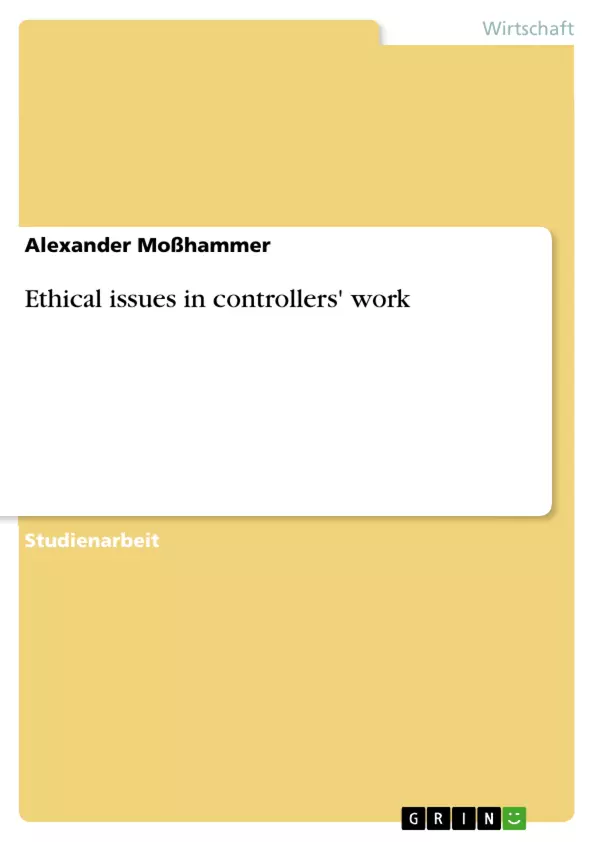Since managers were confronted with the problem of governing extensively extended organizations by some facile mechanisms, instruments and other means, they constituted the professional area of controlling. The main objective of controlling thereby should be to govern and direct organizations and their business actions by financial as well as non-financial information. Because of its easier interpretability financial information until now is still considered as the fundamental instrument of corporate governance, however, non-financial information nowadays is more and more considered with increasing importance. Although this conception of numerical leadership seems to be an innovation nobody in the 21st century wants to miss anymore, it has also a downside. As numerous, more or less grave incidents within the last decades give evidence, sole numerical leadership by the usage of operating numbers and driven by the endeavour of profit maximization regularly comes in conflict with ethical and moral behaviour. At least since the Enron scandal in 2001, which illustrates the absolute worst case of unethical behaviour in controlling and auditing and which is responsible for the loss of billions of dollars as well as thousands of jobs, the society became aware of the hazards that come along with unethical controlling techniques. This case study is tied to this critical approach to controlling and endeavours to show some conflicting points where controlling, driven by the objective of profit maximization, leads to unethical and/or even hazardous behaviour. Taking this deliberation one step further we also try to show possible solutions to prevent or alleviate such unethical behaviour and make a critical appraisal of them. Furthermore we will focus on how ethical values should be educated to ensure conformity of managers’ future business decisions with ethical values. In a last step we endeavour to show, that the conception of ethical behaviour itself constitutes not an absolute measure for assessing economical behaviour. Ethical behaviour is rather a relative way of thinking than an absolute one i.e. what is ethical for one part does not need to be considered as ethical for the other part. Thus it is important to know that there exist some points of view from which controllers’ unethical behaviour may be considered as ethically correct.
Inhaltsverzeichnis
- 1. Introduction
- 2. Controllers and ethics
- 2.1. What is a controller
- 2.2. Role Transformation
- 3. Ethical issues in controllers' work and possible solutions.
- 3.1. Goal incongruences through role conflicts between different levels of organizational structure
- 3.1.1. Role conflict as a reason for goal incongruences
- 3.1.2. Solutions for goal incongruences
- 3.2. The creation of budgetary slacks
- 3.3. Shareholder value orientation VS long-term success orientation
- 3.4. Issues concerning third parties
- 3.1. Goal incongruences through role conflicts between different levels of organizational structure
- 4. Preventing unethical Behaviour - Ethics in Accounting Education
- 5. Scrutinizing the conception of ethics
Zielsetzung und Themenschwerpunkte
Diese Fallstudie befasst sich kritisch mit der Rolle des Controllings und zeigt Konfliktpunkte auf, wo Controlling, getrieben vom Ziel der Gewinnmaximierung, zu unethischem und/oder sogar gefährlichem Verhalten führt. Ziel ist es, mögliche Lösungen zur Verhinderung oder Linderung solchen unethischen Verhaltens aufzuzeigen und diese kritisch zu bewerten. Des Weiteren wird untersucht, wie ethische Werte vermittelt werden sollten, um sicherzustellen, dass zukünftige Geschäftsentscheidungen von Managern mit ethischen Werten übereinstimmen.
- Ethische Herausforderungen im Controlling und mögliche Lösungsansätze
- Zielkonflikte durch Rollenkonflikte zwischen verschiedenen Ebenen der Organisationsstruktur
- Die Entstehung von Budgetspielräumen
- Die Bedeutung ethischer Werte in der Controlling-Ausbildung
- Die relativität ethischen Verhaltens
Zusammenfassung der Kapitel
Kapitel 1: Introduction
Dieses Kapitel erläutert den Hintergrund und die Notwendigkeit von Controlling in modernen Unternehmen. Es wird betont, dass die rein zahlenbasierte Steuerung von Organisationen zu ethischen Problemen führen kann und am Beispiel des Enron-Skandals illustriert, welche schwerwiegenden Folgen dies haben kann.
Kapitel 2: Controllers and ethics
Dieses Kapitel definiert die Rolle des Controllers und zeichnet die Entwicklung der Controlling-Funktion über die Zeit nach. Es werden die beiden Hauptbereiche der Controller-Tätigkeit – Beratung und Überwachung – sowie die damit verbundenen ethischen Herausforderungen beleuchtet.
Kapitel 3: Ethical issues in controllers' work and possible solutions
In diesem Kapitel werden verschiedene ethische Probleme im Controlling thematisiert, darunter Zielkonflikte durch Rollenkonflikte, die Entstehung von Budgetspielräumen und die Frage der Shareholder Value-Orientierung versus langfristiger Erfolg.
Kapitel 4: Preventing unethical Behaviour - Ethics in Accounting Education
Dieses Kapitel hinterfragt die Rolle der Controlling-Ausbildung in der Vermittlung ethischer Werte und analysiert, warum die bisherige Ausbildung in dieser Hinsicht gescheitert ist. Es werden Ansätze zur Vermittlung von ethischem Verhalten in der Controlling-Ausbildung vorgestellt.
Schlüsselwörter
Controlling, Ethik, Unternehmensethik, Gewinnmaximierung, Rollenkonflikte, Budgetspielräume, Shareholder Value, langfristiger Erfolg, Controlling-Ausbildung, ethische Werte, relative Ethik.
- Quote paper
- BSc MSc Alexander Moßhammer (Author), 2016, Ethical issues in controllers' work, Munich, GRIN Verlag, https://www.grin.com/document/438812



